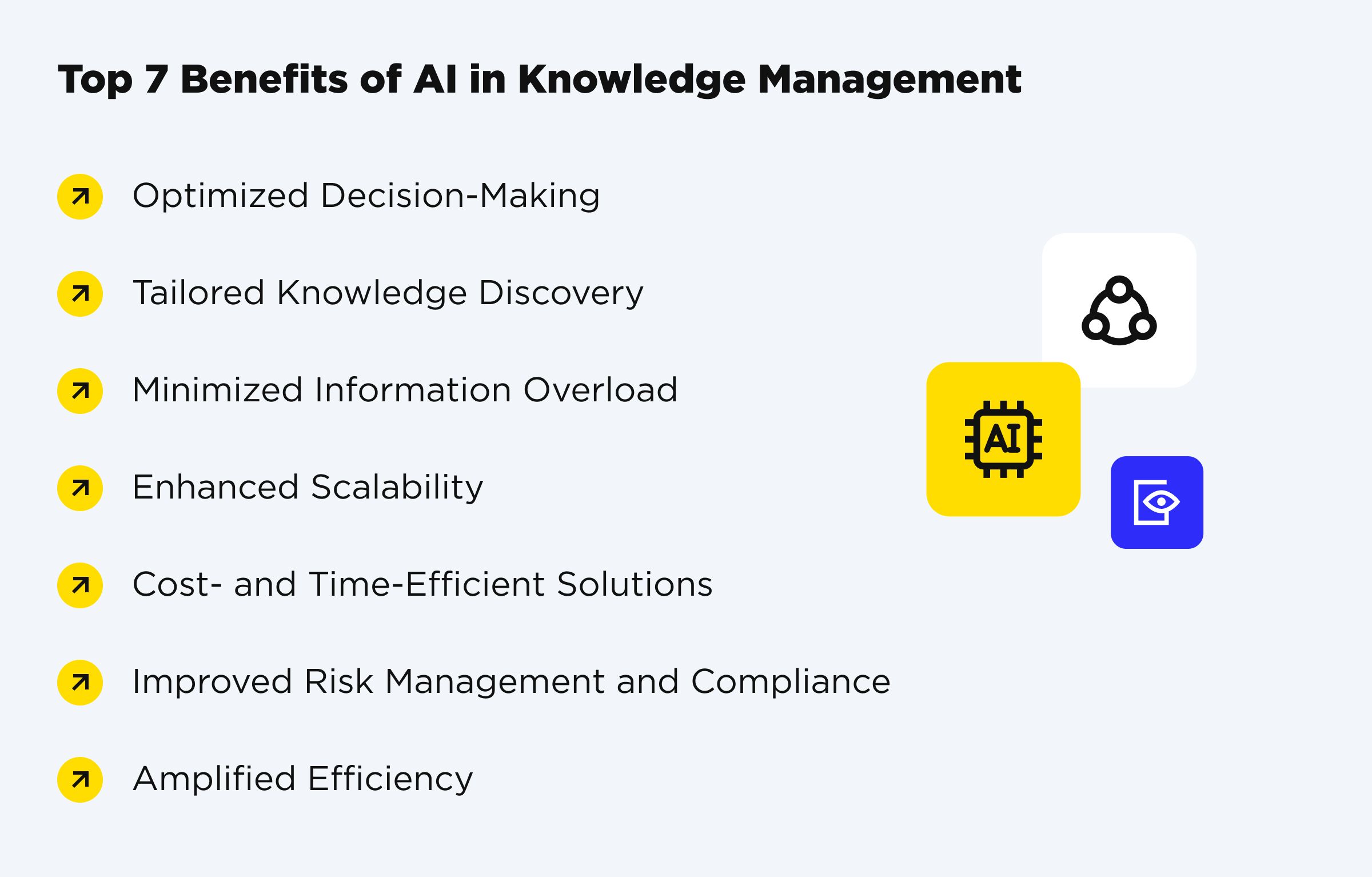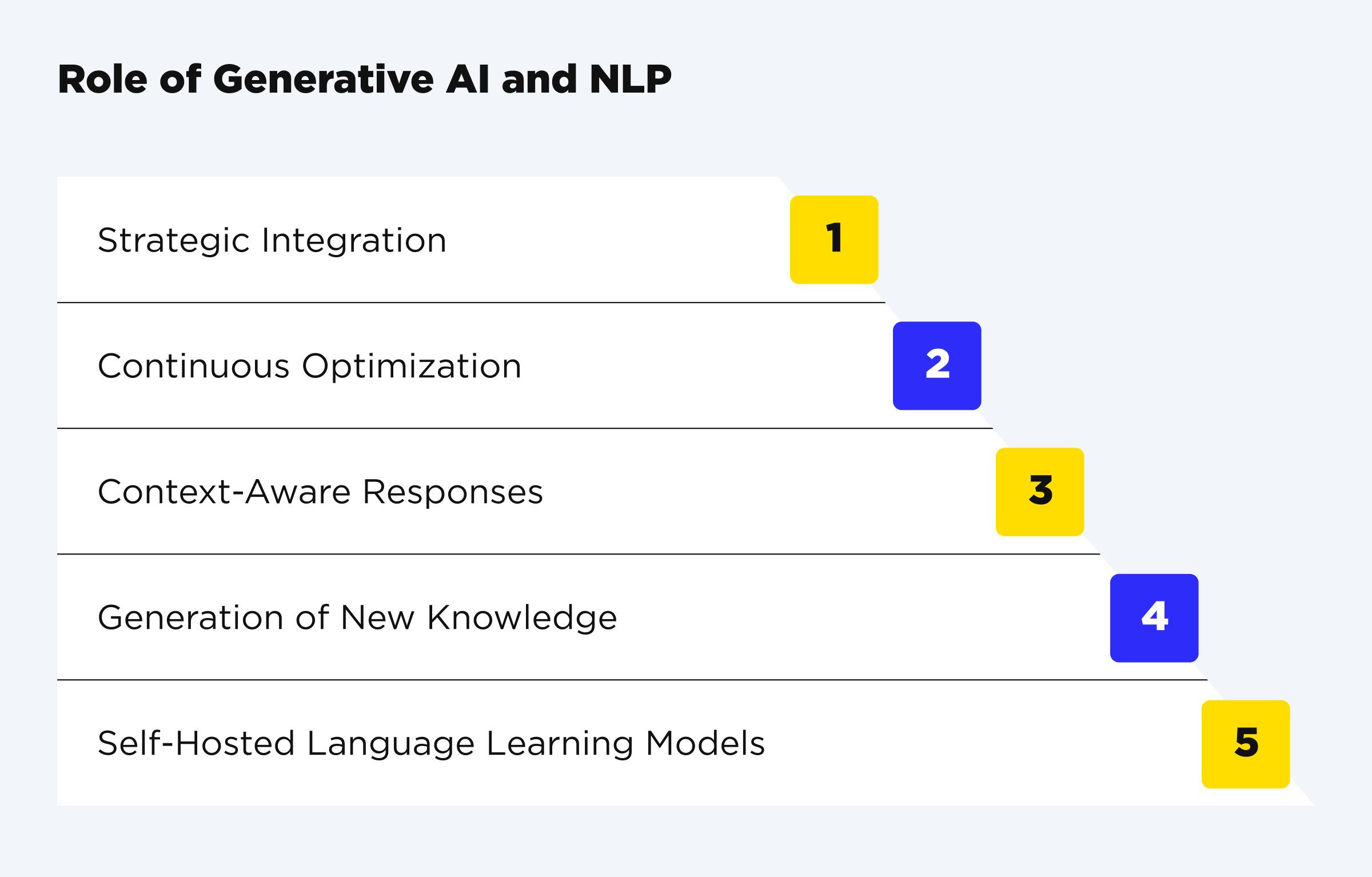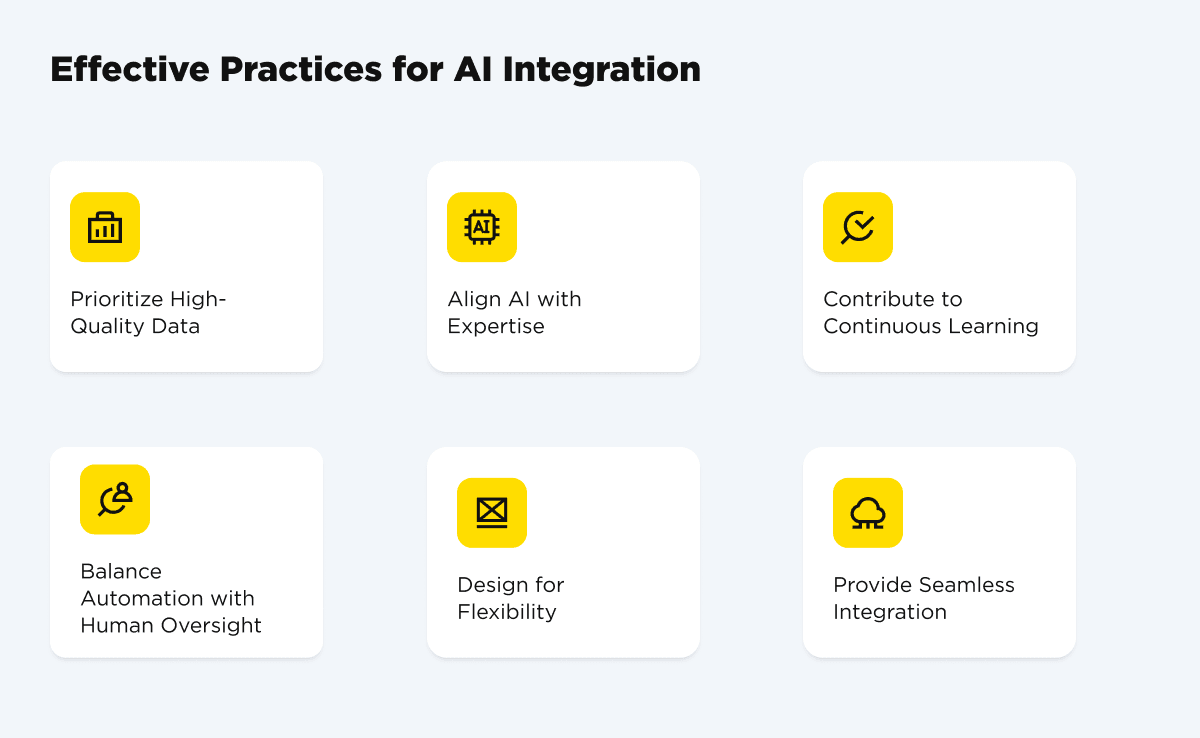Knowledge is power - and every successful business can testify to that. Yet, managing that knowledge effectively in a fast-paced business environment can be overwhelming and intimidating. Artificial Intelligence comes to the rescue once again. AI-driven knowledge management systems are a game-changing solution capable of transforming a company’s workflow. Imagine a workplace where knowledge is seamlessly integrated, decision-making is faster and more accurate, and relevant insights are delivered in real-time. That’s the objective of AI in enterprise KM.
This comprehensive guide will focus on what this key trend really means for your business! Let’s break down the concept of AI-driven solutions for enterprise knowledge management systems, understand its crucial role in reimagining your day-to-day operations, and dive into the benefits, best practices, and ethical considerations of implementing AI into KM strategy. Get ready to unleash the full potential of AI to create a leading modern enterprise.
AI Knowledge Management Solution: Simply Put
At its core, AI-powered knowledge management software is a smart assistant for the organization, designed to keep the team connected and efficient. Think of it as a centralized platform that stores and organizes everything, from simple documents to files, images, and videos. Artificial intelligence and Machine learning enable the software to automatically file, categorize, tag, and retrieve content based on customizable factors, making it a breeze to find what the employees need.
But it doesn’t stop there. A standout feature of these enterprise systems is enhanced collaboration and knowledge sharing across the company, different departments, and locations. By prioritizing the user experience and productivity, AI-powered systems streamline access to a unified knowledge base to encourage a culture of continuous learning and innovation for smoother teamwork.
What Role Does AI Play in Enterprise Knowledge Management?
AI holds a transformational power in the ways organizations manage and leverage their knowledge, enhancing traditional knowledge management systems, strategies, and technologies. Here’s how AI plays a pivotal role:
#1 Efficient data discovery
AI algorithms sift through vast data sources, identifying and swiftly retrieving relevant information so teams don’t waste resources on time-consuming searches.
#2 Intelligent data capture & organization
AI-powered knowledge management systems guarantee improved accessibility and accuracy through systematically organized data and content.
#3 Fostering collaboration
AI-driven software distributed knowledge across all departments and teams, encouraging employees to connect and join forces on shared projects.
#4 Continuous learning & adaptation
AI models learn from the data, offering innovative and tailored solutions that drive strategic advantages and fill the knowledge gaps.
#5 Boosting efficiency
With typical employee spending nearly 30% of their workday searching for information, AI streamlines retrieval, reducing spent time and improving productivity.
For instance, organizations with complicated internal systems like international banks or world-acknowledge brands can immensely speed up cross-departments or cross-national projects. Effective AI knowledge management systems could act as valuable virtual assistants for companies with extensive documentation - like law or insurance offices - to provide better customer experience and enhance decision-making.
Top 7 Benefits AI in Knowledge Management Brings to Enterprises

Integration of AI into enterprise knowledge management unlocks significant advantages that enhance organizational efficiency. Moreover, it’s a powerful tool for your business development toolbox to fuel growth and create space for innovation. Here are the top 7 advantages your company can gain by introducing AI into the KM system.
Amplified efficiency
AI-powered software can act like a virtual human assistant to aid employees with processing vast amounts of data by automating data entry and content retrieval. The system streamlines operations across the organization and gives employees a productivity boost, managing user queries at breakneck speed.
Optimized decision-making processes
AI-powered knowledge management systems provide analytical real-time insights and predictive models leveraging critical knowledge. AI enables improved decision-making and helps organizations make more data-backed choices by identifying trends and flagging potential risks.
Perfected and tailored knowledge discovery
AI now offers personalized knowledge discovery to help employees find the exact file and content faster. The software enhances the search for relevant knowledge by categorizing, tagging, and analyzing data to create an easy-to-navigate system. Knowledge management AI makes this process smarter and more efficient, ensuring teams access the right information at the right time.
Minimized information overload
Traditional KM requires an employee to go through a vast database, which can cause information overload and decrease productivity for the rest of the shift. AI solutions for enterprise knowledge management deliver only filtered content recommendations and relevant data, avoiding overwhelming staff with unnecessary information. With targeted knowledge delivery, professionals can focus on high-priority assignments and decision-making instead of being stuck on a routine task.
Enhanced scalability
The main objective for a business is to grow and expand, so could AI-powered knowledge management software keep up with the company? These systems can effectively scale to manage larger volumes of data and information. Moreover, it adapts to evolving needs, ensuring knowledge remains up-to-date, relevant, and easily accessible as the organization expands.
Cost- and time-efficient solutions
AI solutions for enterprise knowledge management are investments that can accelerate the business and reduce operations expenses. In a long game, it’s an advantageous strategy that offers efficiency, growth, and overall performance increase. Additionally, minimizing the time spent on the information search and user interaction eliminates redundant processes, leading to significant time and cost savings.
Improved risk management and compliance
Outside of optimizing the workflows, AI-driven knowledge management systems could be a strategic asset in risk management. Leveraging AI analytics, the software can identify and flag potential risks that require professional attention. Moreover, KM systems help organizations stay compliant by ensuring quick access to accurate regulations.
Generative AI and NLP: How Do the Advances Transform Knowledge Management in Enterprises?
Let’s shine a spotlight on the technology behind AI-powered enterprise knowledge management and how businesses harvest it to achieve impressive growth. Generative AI defines artificial intelligence that can create new contextually relevant content, like text, images, or insights - for example, chatbots. Natural Language Processing, or NLP, focuses on the interaction between computers and human language, which allows AI to process and respond in a way that mimics human understanding. Together, Generative AI and NLP reshape knowledge management by turning static data repositories into dynamic, intelligent platforms.

So, how do these technologies streamline processes?
#1 Generation of new knowledge
Generative AI synthesizes data from cross-department sources, creating new business insights and content that fill knowledge gaps, broadening an organization’s informational ecosystem.
#2 Context-aware responses
NLP enables KM software to comprehend the context behind queries, providing users with accurate and relevant responses crucial for specific tasks. That way, those systems mimic the efficiency of a knowledgeable assistant.
#3 Continuous optimization
AI-driven enterprise KM systems learn nonstop from user interactions, advancing over time to deliver more applicable and on-topic content.
#4 Self-hosted Language Learning Model
LLMs are a valuable asset for organizations managing highly sensitive or unique information. These systems could learn and grow on specific intellectual resources, providing tailored responses and insights.
#5 Strategic integration
AI needs to align with organizational goals and seamlessly integrate into existing systems for businesses to harvest the full potential of KM software. An Enterprise AI assistant can act as the unifying layer, connecting tools, processes, and data sources into one cohesive ecosystem that supports both employees and decision-makers.
Introducing Generative AI, NLP, LLMs, and Retrieval Augmented Generation tools to your enterprise knowledge management system creates a secure, customized, and efficient powerhouse that continuously grows and adapts to the business, evolving needs, and objectives.

Are you ready to take your business to the next level?
Contact usEffective Practices For Adopting AI Solutions For Enterprise Knowledge Management
How can one ensure the AI-powered enterprise knowledge management solution flawlessly integrates into the business structure? By following the best industry practices and comprehensive approach!
Follow foundational principles
Successful adaptation of an AI solution for enterprise knowledge management begins with a solid foundation:
#1 User-centric design
Prioritize an intuitive interface that fits seamlessly into the operating and existing workflow while regularly gathering user feedback to refine the system.
#2 Transparency
A clear and documented AI process allows the maintenance of audit trails to justify decisions and actions.
#3 Ethical standards
Establish oversight to identify and mitigate biases, ensuring AI-powered systems comply with ethical guidelines.
#4 Scalability
Implement cloud-based and modular solutions to oversee increasing data volumes and user demands as the business expands.
Explore leading methods for knowledge management
Follow the commonly successful practices to ensure AI solutions for enterprise knowledge management are seamlessly integrated into the organizational ecosystem:
#1 Cultivating a knowledge-sharing culture
Encourage staff to collaborate and contribute to the collective knowledge system by promoting regular workshops or “lunch-and-learns” to foster engagement.
#2 Establish governance policies
Protect intellectual property, define clear roles for data management, and enforce data retention practices to validate that knowledge is secure.
#3 Leverage advanced technologies
Use AI-driven tools like semantic search, NLP, and automated tagging to optimize the organization, retrieval, and accessibility of information and content.
#4 Continuous evaluation
Regularly evaluate knowledge assets and AI system performance using customized KPIs to keep systems scalable and align with enterprise objectives.
Strategies to prioritize for effective AI integration in knowledge management

Direct the attention to strategic integration to fully leverage AI-powered knowledge management platforms:
#1 Prioritize high-quality data
Implement robust data governance to maintain high standards for data inputs, ensuring accurate AI recommendations and valuable insights.
#2 Align AI with expertise
Collaborate with top industry experts to validate AI models, ensuring knowledge management tools enhance human insights rather than replace them.
#3 Contribute to continuous learning
Encourage feedback loops to fine-tune AI models over time and regularly retrain systems with fresh data to keep knowledge bases up-to-date.
#4 Provide seamless integration
Focus on compatibility with existing systems to minimize workflow and business operations disruption. Prioritize user-friendly AI tools that require minimal onboarding for a smooth transition.
#5 Balance automation with human oversight
Use AI to handle routine tasks but keep humans in the loop for complex decisions. This balance maximizes efficiency while preserving human judgment where it matters most.
#6 Design for flexibility
Opt for modular architectures that allow easy updates to accommodate changing requirements.
By committing to these practices, enterprises can effectively tap into AI power to enhance knowledge management, driving business efficiency and long-term growth.
Ethical Considerations and Challenges of AI Solutions in Knowledge Management
AI-driven innovation software for enterprise knowledge management is a powerful and transforming outlet to recharge businesses. However, those solutions also raise challenges and critical ethical concerns. One can face data privacy and security issues while implementing an AI-powered knowledge base. Opting for robust cybersecurity measures will improve your defense and help you avoid data breaches or compromising sensitive information.
AI bias is a huge challenge for models trained on incomplete data, as those platforms might amplify existing inequities instead of providing actionable insights. AI solutions for enterprise knowledge management should be balanced with human overseeing to maintain accountability and guarantee AI complements human activity rather than replacing it entirely.
As enterprises embrace AI-powered knowledge management, confronting these challenges is vital for building trust and achieving sustainable success.
Revolutionize Your Knowledge Management with OTAKOYI’s Solutions
Let your business step into the new era of knowledge management! Our top developers and industry experts can build customized business-centered AI-powered knowledge management platforms amplified with state-of-the-art technology. Free your team from time-consuming and performance-drowning tasks by opting for an innovative enterprise search tool to boost productivity and overall efficiency!
Embrace the change and competitive edge AI-driven solutions offer for enterprise growth! Don’t let your competition outpace you - unlock the power of AI to reimagine your knowledge management and future-proof your business.





